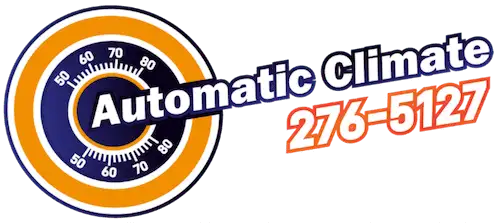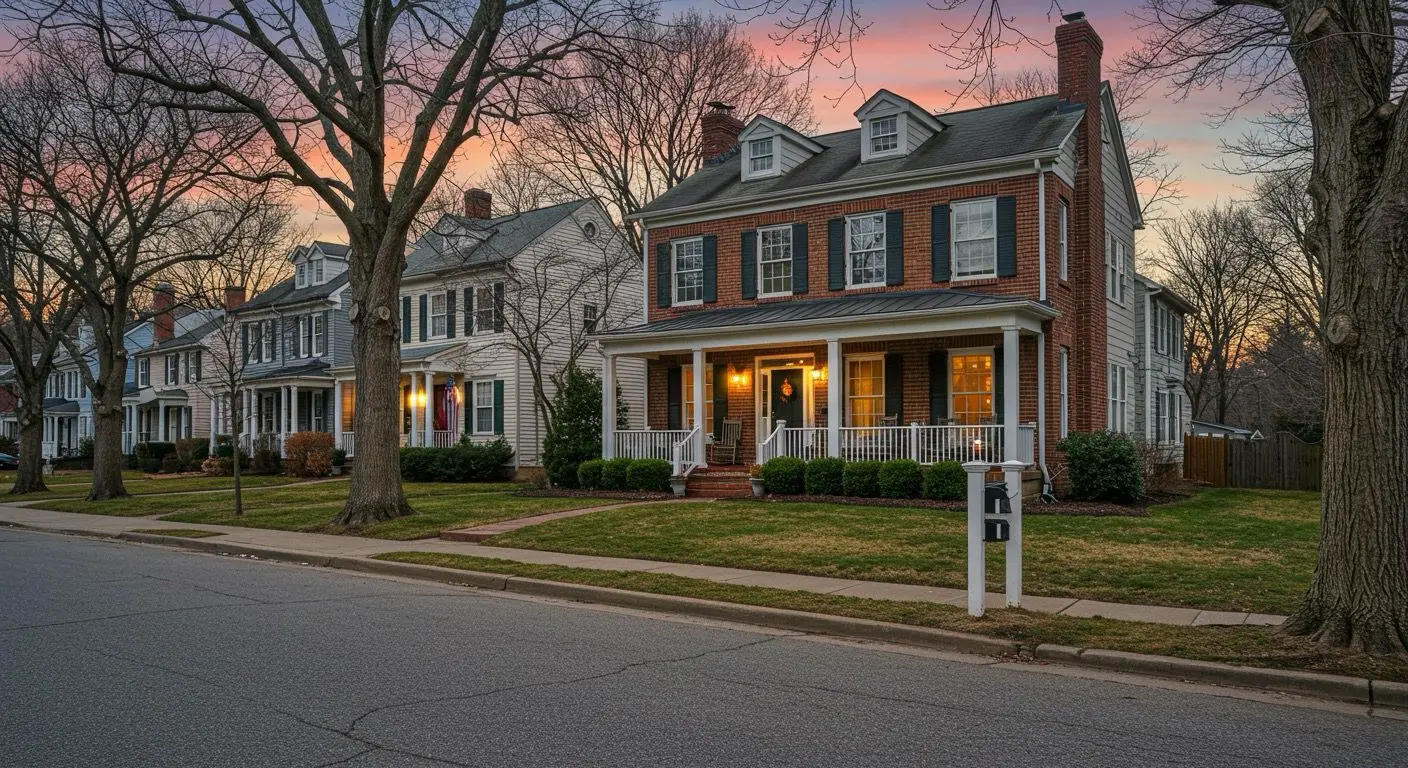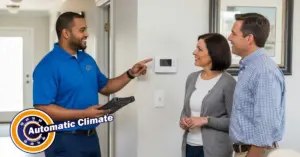What type of air conditioning system is best suited for my home? Your Ultimate Guide
Written by Cole Summers at Automatic Climate in Richmond, Virginia.
Choosing the best air conditioning system for your Richmond home feels like a monumental task, right? Especially when the Virginia humidity hits hard, having reliable cooling isn’t just a luxury; it’s essential for comfort and well-being. You’re probably wondering about the different types, the efficiency ratings, and what factors really matter for *your* specific situation. This ultimate guide is here to demystify the process, helping you understand everything you need to know about selecting the best air conditioning system to keep your home cool and comfortable for years to come. Making the right choice now means enjoying efficient cooling and potentially lower energy bills down the road. Let’s dive into finding the perfect cooling solution tailored just for you.
Understanding the Different Types of Air Conditioning Systems
The first step in choosing the best air conditioning system is knowing your options. Technology has evolved, offering various solutions beyond the traditional central AC. Each type has its pros, cons, and ideal applications. Understanding these differences is crucial for making an informed decision that aligns with your home’s layout, budget, and cooling needs. As the famous inventor Charles Kettering once said, “High achievements always take place in the framework of high expectations.” Let’s set high expectations for your home comfort by exploring the available systems.
1. Central Air Conditioning Systems
This is the most common type of cooling found in American homes, especially those with existing ductwork from a furnace. Central AC systems use a split system approach: an outdoor unit (condenser and compressor) and an indoor unit (evaporator coil, often paired with your furnace or air handler). Refrigerant circulates between the units, absorbing heat from inside your home and releasing it outside. Conditioned cool air is then distributed throughout the house via the duct system. Choosing the best air conditioning system often leads homeowners to central air due to its whole-home cooling capability.
- Pros: Consistent whole-home cooling, utilizes existing ductwork, generally quiet indoors (noisy components are outside), can improve indoor air quality with filtration.
- Cons: Requires ductwork (installation can be costly if none exists), potential energy loss through leaky ducts, less granular zone control without additional equipment.
- Best Suited For: Homes with existing ductwork, homeowners seeking uniform cooling throughout the entire house. Considering central air is a key part of finding the best air conditioning system for larger properties.
2. Ductless Mini-Split Systems
Ductless mini-split systems, also known as mini-splits, are a fantastic alternative, especially for homes without existing ductwork or for targeted cooling in specific areas (like additions, garages, or sunrooms). They consist of an outdoor compressor/condenser unit connected via refrigerant lines to one or more indoor air-handling units, typically mounted high on a wall or in the ceiling. Each indoor unit cools a specific “zone,” allowing for independent temperature control. Their flexibility and efficiency make them a strong contender when determining the best air conditioning system for modern needs.
- Pros: No ductwork required (less energy loss), high energy efficiency, individual zone control, flexible installation options, quiet operation.
- Cons: Higher upfront cost per ton of cooling compared to central AC (but potentially lower operating costs), indoor units are visible, requires professional installation for each unit.
- Best Suited For: Homes without ductwork, room additions, supplementing existing systems, homeowners prioritizing zone control and high efficiency. Many find ductless is the best air conditioning system for older homes or specific problem areas.
Exploring options like these is vital. You can learn more about various system types in resources like The Spruce’s guide to air conditioner types.
3. Window Air Conditioners
Window AC units are self-contained systems designed to cool a single room. They fit directly into a standard window opening or sometimes through a dedicated wall sleeve. They are relatively inexpensive and easy to install, making them popular for apartments, dorm rooms, or supplemental cooling in specific rooms of a larger house. While convenient for localized cooling, they aren’t typically considered the best air conditioning system for whole-home solutions.
- Pros: Lower purchase price, easy DIY installation, effective for single-room cooling.
- Cons: Can be noisy, blocks window view and light, less energy efficient than central or mini-split systems, only cools one room, potential security concern.
- Best Suited For: Cooling individual small-to-medium rooms, renters, budget-conscious buyers needing localized cooling.
4. Portable Air Conditioners
Similar to window units, portable ACs are self-contained systems designed for single rooms. However, they sit on the floor and use an exhaust hose vented through a window kit to expel hot air. They offer more placement flexibility than window units but are generally less efficient and often noisier. They are a step up in convenience for some but still not the best air conditioning system for overall home comfort.
- Pros: No permanent installation, can be moved between rooms (though venting is required), useful when window units aren’t feasible.
- Cons: Typically less efficient and effective than window units of similar BTU rating, can be bulky and noisy, requires window space for exhaust hose, collected water may need draining.
- Best Suited For: Temporary cooling needs, rooms where window ACs can’t be installed, supplemental cooling.
5. Heat Pumps (Air Source)
Air source heat pumps are incredibly versatile systems that provide both heating and cooling. They look and function much like a central air conditioner during the summer, extracting heat from inside your home and releasing it outdoors. In cooler weather, the process reverses: they extract heat from the outside air (even in cold temperatures, down to a certain point) and transfer it inside to warm your home. Because they *move* heat rather than generating it (like a furnace), they are highly energy-efficient, especially in moderate climates like Richmond, VA. For many, a heat pump represents the best air conditioning system combined with efficient heating.
- Pros: Provides both heating and cooling, highly energy efficient (especially for cooling and moderate heating), lower operating costs in suitable climates, qualifies for potential rebates/tax credits.
- Cons: Higher upfront cost than AC-only units, heating efficiency decreases significantly in very cold temperatures (may require supplemental heat source), requires outdoor unit placement.
- Best Suited For: Homeowners needing both heating and cooling, moderate climates, those prioritizing energy efficiency and lower utility bills. It’s a strong candidate for the best air conditioning system providing year-round comfort.
6. Geothermal Heat Pumps
Geothermal systems leverage the stable temperature of the earth beneath the surface for heating and cooling. A network of underground pipes (ground loop) circulates a fluid that absorbs heat from the earth in winter and transfers it into your home, and reverses the process in summer, absorbing heat from your home and dissipating it into the cooler earth. They are incredibly efficient and environmentally friendly but involve significant upfront investment and land requirements for the ground loop installation. While potentially the best air conditioning system for long-term efficiency, the initial cost is a major factor.
- Pros: Extremely high energy efficiency, very low operating costs, environmentally friendly, long system lifespan, provides heating, cooling, and often hot water assist.
- Cons: Very high installation cost, requires significant yard space for ground loop installation (can be disruptive), installation complexity.
- Best Suited For: New construction or major renovations with sufficient land, homeowners prioritizing maximum long-term efficiency and sustainability, those planning to stay in the home long-term.
Quick Comparison: Finding the Best Air Conditioning System
Sources: Based on information from This Old House and Energy.gov.
Key Factors to Consider When Choosing Your System
Knowing the types is just the beginning. Selecting the truly best air conditioning system requires evaluating several critical factors specific to your home and lifestyle. Overlooking these can lead to an undersized or oversized system, inefficiency, discomfort, and wasted money. It’s about finding the right balance for optimal performance. Remember, as Benjamin Franklin purportedly said, “An investment in knowledge pays the best interest.” Investing time in understanding these factors will pay dividends in comfort and savings.
1. Home Size and Layout
The square footage of the area you need to cool is paramount. A system that’s too small will run constantly without adequately cooling your home, while an oversized system will cycle on and off too frequently (short-cycling). Short-cycling is inefficient, fails to properly dehumidify the air (leaving it feeling clammy), and puts excessive wear and tear on components. A professional load calculation (Manual J) is the most accurate way to determine the right size (measured in BTUs or tons) needed for choosing the best air conditioning system. Layout matters too – open floor plans are easier to cool uniformly than multi-story homes with many separate rooms, which might benefit from zoning or mini-splits.
2. Climate and Location (Hello, Richmond!)
Richmond’s hot and humid summers demand a robust air conditioning system capable of handling both high temperatures and significant moisture removal. The efficiency and dehumidification capabilities are crucial here. Systems designed for drier climates might struggle. This local climate factor heavily influences the selection of the best air conditioning system for Virginia residents. Heat pumps are particularly well-suited for our region’s relatively moderate winters and hot summers.
3. Energy Efficiency (SEER, EER, HSPF)
Energy efficiency ratings tell you how much cooling (or heating) a system provides for the energy it consumes. Higher ratings mean lower energy bills and reduced environmental impact. Key ratings include:
- SEER (Seasonal Energy Efficiency Ratio): Measures cooling efficiency over an entire cooling season for central AC and heat pumps. The current minimum standard is 13 or 14 depending on region, but higher SEER ratings (16+) offer significant savings. Look for ENERGY STAR certified models, which meet stricter efficiency criteria. Understanding SEER is vital for choosing the best air conditioning system for long-term savings.
- EER (Energy Efficiency Ratio): Measures cooling efficiency at a specific outdoor temperature (usually 95°F). It’s often used for window and portable units, but also relevant for central systems. Higher is better.
- HSPF (Heating Seasonal Performance Factor): Measures the heating efficiency of heat pumps over an entire heating season. Higher HSPF means more efficient heating.
Investing in a higher efficiency unit might cost more upfront but can lead to substantial savings over the system’s lifespan. Check resources like ENERGY STAR for information on efficient models and potential tax credits, which can make choosing the best air conditioning system more affordable.
4. Existing Ductwork Condition
If you’re considering central air conditioning or a heat pump using ducts, the condition of your existing ductwork is critical. Leaky, poorly insulated, or improperly sized ducts can waste 20-30% of the conditioned air, negating the benefits of even the most efficient AC unit. Before installing a new central system, have your ducts inspected and sealed or repaired if necessary. If your home lacks ducts or has problematic ductwork, a ductless mini-split system might be the best air conditioning system alternative.
5. Installation Quality
Even the highest-rated, most expensive air conditioner will perform poorly if not installed correctly. Proper installation ensures correct refrigerant charge, airflow, duct connections (if applicable), and overall system performance and longevity. Always choose a qualified, licensed, and experienced HVAC contractor like Automatic Climate. Proper installation is arguably as important as the equipment itself when aiming for the best air conditioning system performance. As CNET highlights, the installer is crucial; find trustworthy contractors recommended by brands or with solid local reputations.
6. Budget (Upfront vs. Long-Term Costs)
Your budget plays a significant role. Consider both the upfront purchase and installation cost and the long-term operating costs (energy bills and maintenance). A cheaper, less efficient unit might save money initially but cost more over time through higher energy consumption. Conversely, a high-efficiency system like a geothermal unit has a steep initial price but offers the lowest operating costs. Finding the best air conditioning system involves balancing these factors based on how long you plan to stay in your home and your financial priorities.
7. Noise Levels
Consider the noise generated by both the indoor and outdoor units. Noise levels are measured in decibels (dB). Quieter operation enhances comfort, especially for units located near bedrooms or outdoor living spaces. Look for models with lower dB ratings, variable-speed fans, and compressor sound insulation. This is an often-overlooked factor when searching for the best air conditioning system.
Essential Maintenance for Your Chosen AC System
Once you’ve chosen the best air conditioning system, regular maintenance is key to efficiency and longevity. Neglecting it leads to higher bills and premature failure.
Change/Clean Filters Regularly
This is the #1 homeowner task. Check monthly during peak season; replace/clean every 1-3 months depending on filter type and household factors (pets, allergies). Clogged filters restrict airflow, reduce efficiency, and strain the system.
Keep Outdoor Unit Clear
Ensure at least 2 feet of clearance around the outdoor condenser unit. Trim shrubs, remove leaves, grass clippings, and debris to allow proper airflow. Restricted airflow reduces efficiency.
Check Condensate Drain Line
Ensure the drain line (usually a PVC pipe near the indoor unit) isn’t clogged. Backed-up water can cause damage and shut down the system. Periodically flush with vinegar or use a wet/dry vac to clear obstructions.
Inspect Outdoor Unit Fins
Carefully check the metal fins on the outdoor coil. If bent, they can restrict airflow. Use a fin comb (gently!) to straighten them if needed.
Schedule Professional Tune-Ups Annually
Have a qualified technician (like Automatic Climate!) perform an annual check-up. They’ll clean coils, check refrigerant levels, inspect electrical components, lubricate motors, and ensure optimal performance. This preventative step helps catch small issues before they become major repairs and is crucial for maintaining the best air conditioning system performance.
Sources: Maintenance tips adapted from CNET and general HVAC best practices.
Benefits of Choosing the Right System & Professional Installation
Taking the time to select the best air conditioning system for your specific needs pays off significantly. It’s not just about staying cool; it’s about optimizing comfort, efficiency, and long-term value. Conversely, the wrong system or poor installation can lead to endless frustration and high costs.
Why the Right Choice Matters
- Optimal Comfort: A correctly sized and chosen system provides consistent temperatures and effective humidity control throughout your home. No more hot spots or clammy air.
- Energy Savings: Matching the system type and efficiency rating (SEER) to your needs minimizes energy waste, leading to lower monthly utility bills. Choosing the best air conditioning system from an efficiency standpoint saves money.
- Improved Indoor Air Quality: Many modern systems offer advanced filtration options, reducing dust, allergens, and pollutants for a healthier indoor environment.
- Increased Home Value: A new, efficient air conditioning system is an attractive feature for potential homebuyers.
- System Longevity: A properly sized and installed system experiences less strain, leading to fewer breakdowns and a longer operational lifespan. According to CNET, well-maintained systems can last 15-20 years or more.
- Peace of Mind: Knowing you have a reliable and efficient cooling system provides comfort and security, especially during peak summer heat. Selecting the best air conditioning system brings this peace.
The Critical Role of Professional Installation
As mentioned earlier, installation quality is paramount. DIY installation is generally only feasible (and recommended) for window units. For central AC, heat pumps, mini-splits, and geothermal systems, professional installation by a licensed and experienced HVAC contractor is essential. Here’s why working with experts like Automatic Climate ensures you get the best air conditioning system performance:
- Accurate Sizing: Professionals perform load calculations (Manual J) to determine the precise size needed, avoiding issues of short-cycling or inadequate cooling.
- Correct Refrigerant Charging: Improper refrigerant levels drastically reduce efficiency and can damage the compressor. Technicians have the tools and expertise to charge the system correctly.
- Proper Ductwork Connection/Sealing: Ensuring airtight duct connections prevents costly air leaks.
- Electrical Safety: HVAC systems involve high voltage. Professionals ensure safe and code-compliant electrical connections.
- System Testing and Calibration: Installers test the system thoroughly to verify proper airflow, temperature differentials, and overall operation.
- Warranty Protection: Manufacturer warranties often require installation by a licensed professional. DIY installation can void your warranty.
- Local Code Compliance: Professionals are knowledgeable about local building codes and permit requirements in Richmond, ensuring your installation is compliant.
Trusting experts ensures your investment in the best air conditioning system delivers the comfort and efficiency you expect for years to come.
Ready to Find the Perfect AC for Your Richmond Home?
Feeling overwhelmed by the options? Let the experts at Automatic Climate help! Since 1983, we’ve been helping Richmond homeowners choose and install the best air conditioning system for their needs. We offer personalized consultations, professional installation, and reliable maintenance services.
Case Study: The Miller Family’s Comfort Upgrade
Challenge: The Millers lived in an older Richmond home with no existing ductwork. They relied on noisy window units that struggled to cool the upstairs bedrooms evenly, leading to high energy bills and uncomfortable nights.
Solution: After a consultation with Automatic Climate, they decided the best air conditioning system for their situation was a multi-zone ductless mini-split system. We installed an outdoor unit and three indoor wall-mounted units – one in the main living area and one in each of the two upstairs bedrooms.
Result: The Millers now enjoy quiet, efficient cooling with individual temperature control in each zone. Their energy bills decreased significantly, and the house is consistently comfortable, even during the hottest summer days. The installation was minimally invasive, preserving the character of their older home.
Source: Example based on common scenarios addressed by professional HVAC installations.
Advanced Features and Long-Term Considerations
Beyond the basic system type, modern air conditioners offer features that can enhance comfort, control, and efficiency. Considering these options can help you truly customize and select the best air conditioning system for the future.
Smart Thermostats
Upgrading to a smart thermostat (like Nest, Ecobee, or those integrated with specific HVAC brands) offers significant advantages. They learn your schedule, allow remote control via smartphone apps, provide energy usage reports, and can automatically adjust settings for savings when you’re away or asleep. Many integrate with voice assistants like Alexa or Google Assistant. A smart thermostat complements the best air conditioning system by optimizing its usage.
Zoning Systems
For central air systems, zoning allows you to divide your home into different areas (zones), each controlled by its own thermostat. Dampers in the ductwork open or close to direct airflow only to the zones needing cooling (or heating). This prevents wasting energy cooling unoccupied rooms and allows for customized comfort levels in different parts of the house (e.g., cooler upstairs bedrooms at night). Zoning can make a central system behave more like the best air conditioning system for varied usage patterns.
Variable-Speed Technology
Traditional single-stage air conditioners run at full blast or are off. Two-stage systems have a high and low setting. Variable-speed systems (often found in higher-end units and mini-splits) can adjust their output precisely across a wide range. They run longer at lower speeds, providing more consistent temperatures, better humidity control, quieter operation, and superior energy efficiency. This technology is often featured in what many consider the best air conditioning system models available today.
Indoor Air Quality (IAQ) Enhancements
Consider integrating IAQ products with your HVAC system. Options include high-MERV filters (MERV 11-16 capture smaller particles), UV germicidal lights (kill mold and bacteria on coils), and whole-home humidifiers/dehumidifiers. These contribute to a healthier indoor environment, complementing the cooling function of the best air conditioning system.
Long-Term Savings and Environmental Impact
Choosing an energy-efficient system isn’t just about lower bills; it’s also about reducing your home’s carbon footprint. Modern refrigerants (like R-410A or newer, lower-GWP options like R-32) are less harmful to the ozone layer than older types (like R-22, which is phased out). High SEER ratings mean less electricity consumption, reducing demand on power plants. Considering the environmental aspect is part of choosing the truly best air conditioning system for a sustainable future. As environmentalist Jacques Cousteau noted, “The sea, the great unifier, is man’s only hope. Now, as never before, the old phrase has a literal meaning: we are all in the same boat.” Our energy choices impact everyone.
Frequently Asked Questions (FAQ) about Choosing the Best Air Conditioning System
1. What is SEER and why is it important?
SEER (Seasonal Energy Efficiency Ratio) measures an AC’s cooling efficiency over a season. A higher SEER means better efficiency and lower energy bills. It’s crucial for comparing the long-term operating cost when selecting the best air conditioning system.
2. How do I know what size AC unit I need?
Accurate sizing requires a professional load calculation (Manual J) considering square footage, layout, insulation, windows, climate, etc. Don’t rely on rules of thumb. An improperly sized unit is never the best air conditioning system.
3. Is a heat pump a good choice for Richmond, VA?
Yes, air source heat pumps are generally excellent choices for Richmond’s climate, providing efficient cooling and effective heating for most of the year. They are often considered the best air conditioning system choice for year-round comfort here.
4. What’s the difference between central AC and a ductless mini-split?
Central AC uses ducts to distribute cool air throughout the house from one central unit. Mini-splits use individual indoor units in different zones connected to an outdoor unit, requiring no ducts. Choosing between them depends on whether you have ducts and need zone control.
5. How often should I replace my air filter?
Check monthly during cooling season. Replace basic 1-inch filters every 1-3 months. Higher quality pleated filters (4-5 inches thick) might last 6-12 months. Follow manufacturer recommendations and consider household factors.
6. Can I install a central air conditioner myself?
No, central AC installation requires specialized knowledge, tools, refrigerant handling certification, and electrical work. Always hire a licensed HVAC professional like Automatic Climate to ensure safety, efficiency, and warranty validity. This ensures you get the best air conditioning system performance.
7. Are more expensive AC units always better?
Higher price often correlates with higher efficiency (SEER), more features (variable speed, smart controls), and potentially better build quality/warranty. However, the “best” unit is one correctly sized and suited to your specific needs and budget.
8. What maintenance does an AC unit need?
Regular filter changes, keeping the outdoor unit clear, checking the drain line, and annual professional tune-ups are essential for maintaining the best air conditioning system efficiency and lifespan.
9. How long should a new air conditioner last?
With proper installation and regular maintenance, a typical central air conditioner or heat pump can last 15-20 years. Some sources like CNET suggest even longer lifespans are possible.
10. Does duct cleaning improve AC efficiency?
While duct cleaning removes dust and debris, its impact on efficiency is debated unless ducts are severely clogged. Sealing duct leaks, however, provides significant efficiency gains. Focus on sealing and proper filtration first.
11. What are BTUs?
BTU (British Thermal Unit) is a measure of heat energy. In AC terms, it indicates the amount of heat an air conditioner can remove from a space per hour. Higher BTU means more cooling capacity, essential for sizing the best air conditioning system.
12. Is financing available for new AC systems?
Yes, many HVAC companies, including Automatic Climate, offer financing options to help homeowners manage the upfront cost of purchasing the best air conditioning system.
13. What’s the advantage of a variable-speed air handler?
Variable-speed motors adjust airflow precisely, leading to more consistent temperatures, better humidity control, quieter operation, improved air filtration, and higher energy efficiency compared to single-speed motors.
14. Can a new AC system help with allergies?
Yes, by using high-efficiency filters (MERV 11+) and potentially adding UV lights or air purifiers, a modern HVAC system can significantly reduce airborne allergens like dust, pollen, and pet dander.
15. What is a Manual J load calculation?
It’s an industry-standard method used by HVAC professionals to calculate the precise heating and cooling needs (load) of a specific house, ensuring the best air conditioning system size is selected.
16. Do I need a permit to replace my AC in Richmond?
Generally, yes. Replacing an HVAC system typically requires permits to ensure the work meets local building and safety codes. A reputable contractor like Automatic Climate handles the permitting process.
17. What refrigerant should my new AC use?
New systems primarily use R-410A. Older R-22 is phased out. Newer, lower Global Warming Potential (GWP) refrigerants like R-32 are also becoming more common in certain equipment (like some mini-splits).
18. How much space does an outdoor AC unit need?
Allow at least 2 feet of clear space around the sides and top of the outdoor condenser unit for proper airflow and service access. Avoid planting dense shrubs right next to it.
19. What are the signs my current AC needs replacing?
Frequent breakdowns, age (15+ years), rising energy bills, poor/uneven cooling, excessive noise, and use of obsolete R-22 refrigerant are all signs it might be time to consider the best air conditioning system upgrade.
20. Where can I learn more about energy efficiency standards?
The Department of Energy and ENERGY STAR websites are excellent resources for understanding efficiency ratings and finding qualified products.
Sources: FAQ answers compiled from HVAC industry knowledge and resources like This Old House and CNET.
Conclusion: Making the Confident Choice
Choosing the best air conditioning system for your Richmond home involves careful consideration of system types, sizing, efficiency, budget, and installation quality. Whether it’s the whole-home coverage of central air, the zoned efficiency of a ductless mini-split, or the dual-functionality of a heat pump, the right choice depends on your unique circumstances. By understanding the key factors outlined in this guide and partnering with trusted professionals like Automatic Climate, you can invest confidently in a system that will provide reliable, efficient comfort for many summers to come. Don’t hesitate to reach out for expert advice tailored to your home – finding the best air conditioning system is our specialty!
Relevant External Resources:
#AirConditioning #HVAC #HomeComfort #CoolingSystem #EnergyEfficiency #CentralAir #Ductless #MiniSplit #HeatPump #RichmondVA #HomeImprovement #AutomaticClimate #ChooseAC
Legal Disclaimer:
This article was drafted with the assistance of a Large Language Model, specifically Gemini, which was used for initial drafting and article outlining. The content was subsequently reviewed, edited, and fact-checked by a human writer to ensure accuracy, clarity, and adherence to editorial standards. While AI assists in the creation of this content, the human author(s) retain editorial control and full responsibility for the final content, including its accuracy and integrity. Readers should be aware that AI-generated content may present limitations, and the information provided should be considered with this in mind.
The information provided in this article is for general informational purposes only. While we strive to keep the information up-to-date and correct, we make no representations or warranties of any kind, express or implied, about the completeness, accuracy, reliability, suitability, or availability with respect to the 1 article or the information, products, services, or related graphics contained in the article for any purpose. Any reliance you place on such information is therefore strictly at your own risk.
2 HVAC systems involve electrical components, refrigerant, and potentially natural gas; attempting repairs without proper training and safety precautions can result in injury, property damage, or voiding warranties. Always consult with a qualified and licensed HVAC professional, like those at Automatic Climate (https://www.automaticclimate.com/, (804) 803-1983), for diagnosis and repair of HVAC issues.
Our Trusted Partners
EXCELLENTTrustindex verifies that the original source of the review is Google. Ashante Coleman was very professional answered any questions I had. I felt very satisfied with my service.Trustindex verifies that the original source of the review is Google. Arrived at the time designated. Checked everything, did not take all day. Very polite and thorough.
Owner's reply
Thank you so much for the 5 stars! We're glad you're happy with our service.Trustindex verifies that the original source of the review is Google. AJ was very prompt and diligent in finding my AC problem. Extremely professional and easy to work with. Your organization should be proud to have AJ on your team!Trustindex verifies that the original source of the review is Google. Lou was great. Explained everything and very professional.Trustindex verifies that the original source of the review is Google. We’ve used automatic climate for regular maintenance of our HVAC systems as well as the replacement of an old unit and duct cleaning. From salesman to technician, they have always been professional, courteous, and honest. They explain my options and let ME make an informed decision. Their prices are reasonable, especially for the quality of work performed.Trustindex verifies that the original source of the review is Google. Lou came out today for our hvac tune up & was great! Very informative and friendly. Will definitely use them again when it’s time for our next tune up or any repairs.Trustindex verifies that the original source of the review is Google. Lou did a fantastic jobTrustindex verifies that the original source of the review is Google. Yet again, I have nothing but good things to say about my experience with Automatic Climate’s service. AJ did a great job.
Owner's reply
Thank you so much for this great 5-star review. We really appreciate your business!Trustindex verifies that the original source of the review is Google. I have a contract for regular cleaning with Automatic Cleaning. I’ve had great experiences with all their staff- super friendly, easy to schedule, they are always on time and well educated. Ashante, in particular, was amazing! She took the time to explain and outline all my options.Trustindex verifies that the original source of the review is Google. The technician was great. Friendly and knowledgeable and helpful.Verified by TrustindexTrustindex verified badge is the Universal Symbol of Trust. Only the greatest companies can get the verified badge who has a review score above 4.5, based on customer reviews over the past 12 months. Read more
Exclusive Promotions and Coupons

$39 A/C
Tune-Up!
Take advantage of this limited time offer. Keep your home cool this summer with Automatic Climate!*
*Expires 12/30/25. Offer can’t be combined with other offers or promotions. Offer valid for existing and new clients.
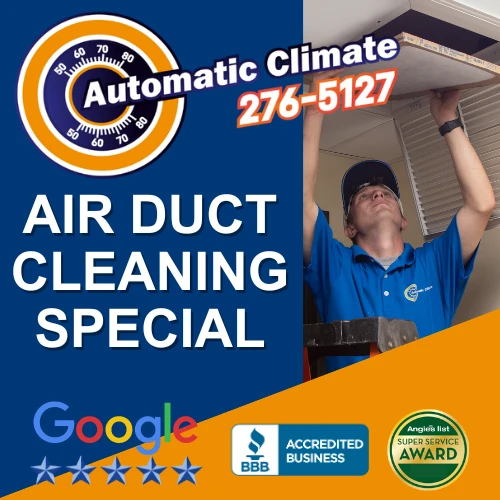
$50 OFF Air
Duct Cleaning
Save $50 on your next air duct cleaning service for a limited time!*
*Expires 12/30/25. Offer can’t be combined with other offers or promotions. Offer valid for existing and new clients.
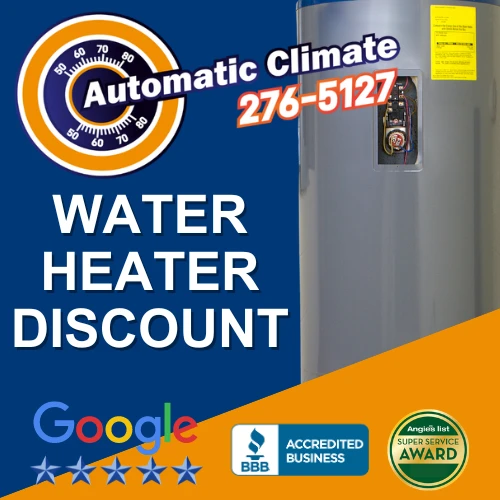
$49 Water
Heater Flush
Take advantage of this $49 water heater flush and make sure your water is heating properly!*
*Expires 12/30/25. Offer can’t be combined with other offers or promotions. Offer valid for existing and new clients.
